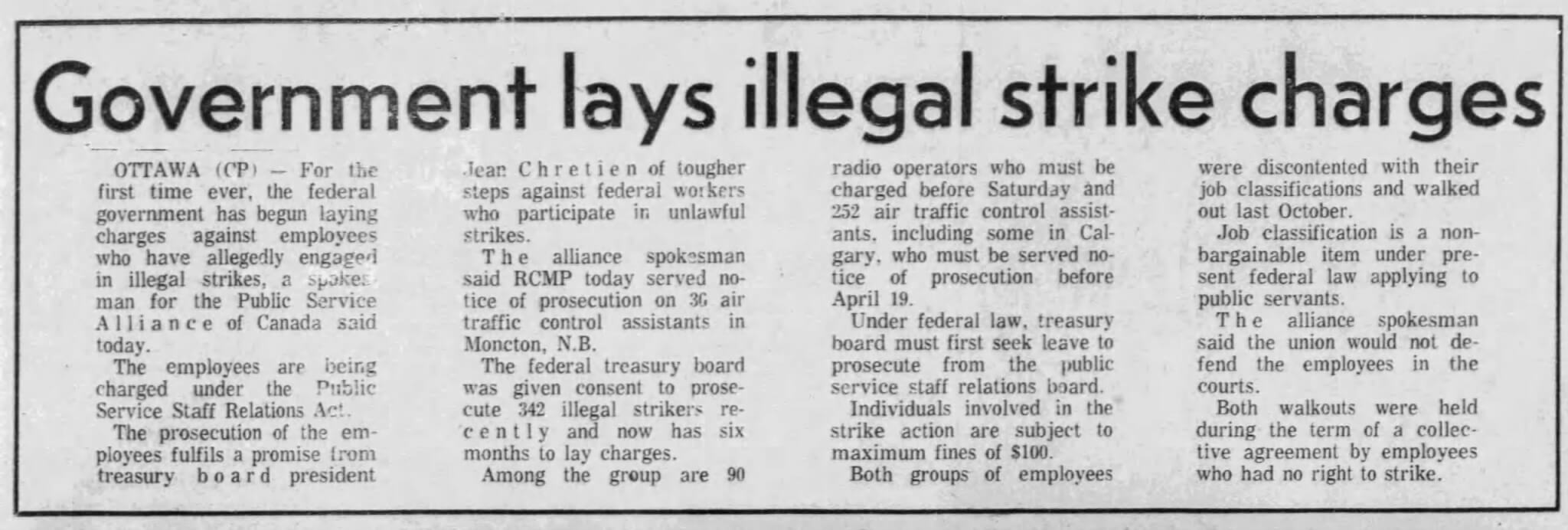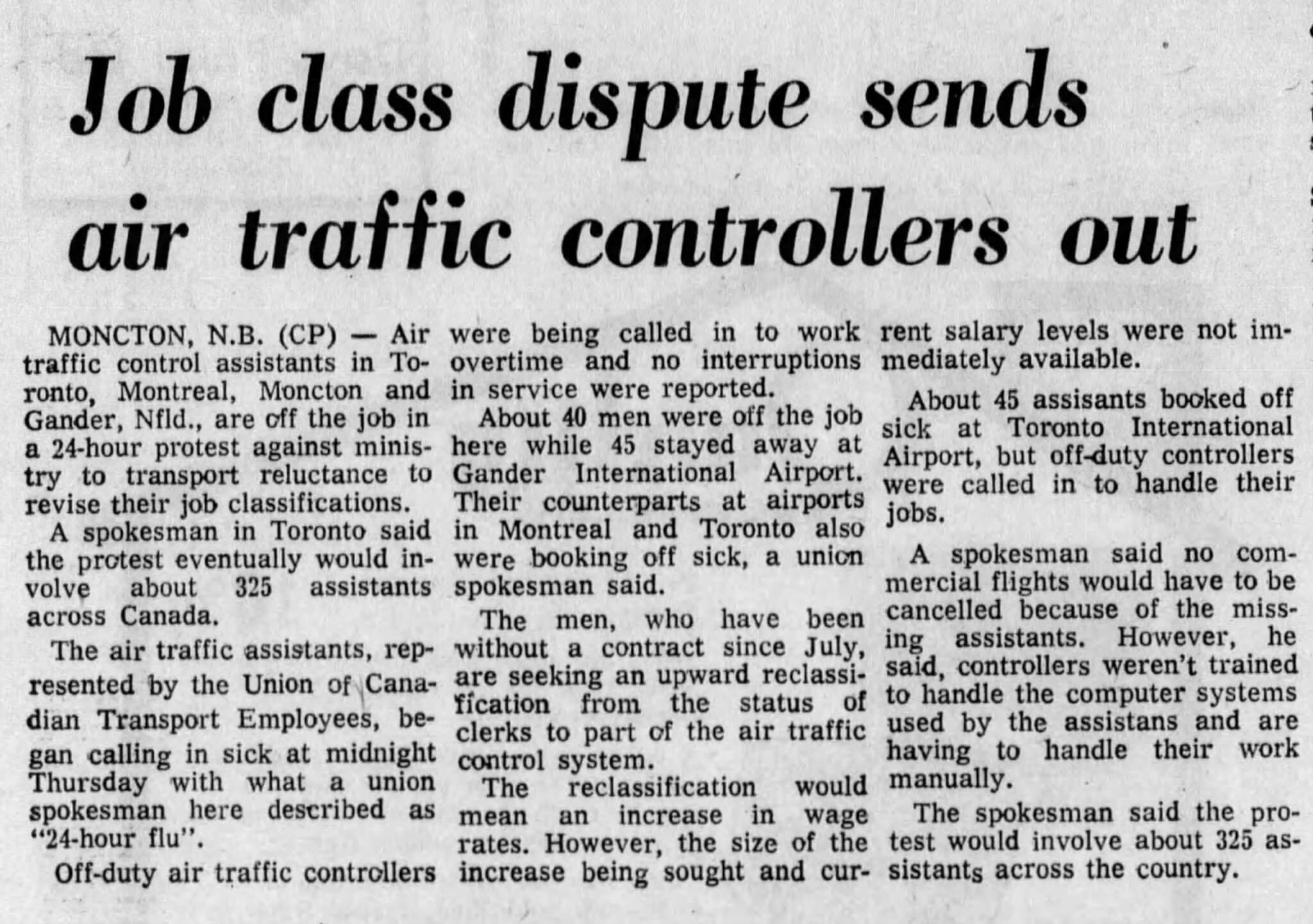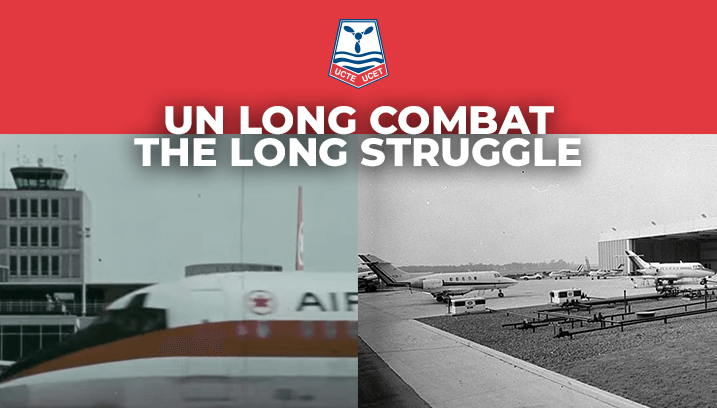Air Traffic Control Assistants – The long struggle
At midnight on Oct 26, 1973, UCTE members working at the nation’s airports as Air Traffic Control Assistants started to call in sick. The media called it the “24-hour flu.” It started in the east in Gander and Moncton and spread west to Montreal, Toronto, Winnipeg, Calgary, Edmonton and Vancouver and several other airports. Management scrambled to find replacements often calling in extra Air Traffic Controllers to do the work. This job action by some 325 members was the result of the reluctance of Transport Canada to revise their job classifications. The workers were paid at a CR 3 level and the members felt that they were doing technical work at a higher level than what the employer valued them at.
In the early 1970s the members of the newly created PSAC/UCTE were dealing with years of pent-up frustration with the Federal Government. The new laws passed in 1967 granted union rights of collective bargaining and striking, but members were impatient with long drawn-out processes and the employer’s failure to deal with their grievances. If the employer would not listen, they were willing to take job action even if these “wildcat strikes” were illegal.
One year later there was still no action on the part of the employer when the Control Assistants started a national strike that lasted one week. On Oct 14th, 1974, the members walked off the job from Vancouver to Gander. The reclassification they were demanding would have meant a 25% increase in pay. Their collective agreement would not expire until the fall of 1975, but the new laws would not allow the unions to negotiate classification so why wait until a strike would have been legal if they could not bargain the change anyway?
Weeks after they returned to work, the employer finally acted not on the classification but rather legal action. Treasury Board (TB) went to the Public Service Staff Relations Board seeking permission to take file charges against the assistants for their illegal strike. The early 1970s saw several wildcat strikes by workers frustrated by the government. The firefighters had held an illegal strike in April and postal workers had also walked off the job. Then the airport radio operators began rotating strikes in 1974. The President of the Treasury Board sent a letter to all public employees saying the “government would stand for no more wild cats.”
Prime Minister Pierre Trudeau and Treasury Board President Jean Chrétien had enough. Chrétien said, “the government intends to use tough action in dealing with unlawful strikes.” A few months later the first time RCMP started laying charges against the employees that had taken part in the weeklong strike. 36 control assistants in Moncton were the first charged. Then from Gander to Pitt Meadows, BC, 252 air control assistants and 90 radio operators were charged under the Public Service Staff Relations Act for participating in an unlawful strike. They were going to court facing a $100 fine.
The root of the classification dispute was that the control assistants were required to take six months of training to do their job but were classified as clerks. The received $8,000 a year, the same as other office clerks requiring no technical education. Their duties included processing flight plans, provide alert service for search & rescue for small aircraft, and weather forecasts for the air traffic controllers. They also supplied data to the North American Defence Command (NORAD). For years the members had struggled to have their classifications addressed with no results. They saw job action as the only answer. The same employer that refused to act, that denied their union the right to bargain classification, also had the power to prosecute and so for the first time they were bringing their employees to court.
Going to court was easier said than done. The government had six months to lay charges, but they delayed and only had a few weeks to act. When they did, they charged people who were away from work for other reasons including being on sick leave. The trials were to take place at the provincial court level, so the fines ranged from the $100 maximum in Alberta to $10 in New Brunswick, where that came with a conditional discharge preventing a criminal record for those strikers. In Prince Albert, Saskatchewan, members were fined $20.
In July, a judge in Calgary hearing a case found the member not guilty because of a lack of evidence. After that case the judge pointed out that he could no longer hear any further cases of people pleading not guilty because he was “not empowered by the law” to sit on more than one case involving the same witnesses. The lawyer for the defence pointed out there were not enough judges in Alberta to hear the remaining cases of those pleading not guilty. In Edmonton a judge dismissed a charge because the prosecution could not prove the man was even a member of the bargaining unit that went on strike. Soon the charges began being stayed against members.
As the workers stood in court rooms awaiting their fate, word came from Transport Canada that the Air Traffic Control Assistants were to be given new duties. They would be provided with a five-week training course prior to assuming the duties formerly done by the Air Traffic Controllers; posting aircraft positions, pre-taxi clearance, and flight data plotting. The new roles would raise wages from $400 to $1,400 giving the members an increase of between 4% to 17% with the lowest paid receiving the larger increases.
But now Transport Canada had a new problem. The Air Traffic Controllers’ union, the Canadian Air Traffic Control Association (CATCA), came out against the changes in duties. All was not well in the control towers of Canada’s airports. Even though their wages would not change they wanted this new policy stopped. They claimed that this created a hazard to flight safety and the flying public. The CATCA, PSAC/UCTE, and Federal government all were in a standoff. In August the Treasury Board applied for an injunction to prevent the 2,200 controllers from taking illegal strike action over the new duties for the assistants.
In the end the Federal Government got its injunction, CATCA called off its threatened strike, and then in January of 1976 the first class of Air Traffic Control Assistants graduated. UCTE members had fought a long battle against restrictive laws, a reluctant employer, a wildcat strike, criminal charges, and another union, to finally win. The leader of the Air Traffic Control Assistants Association was Bob Cox who in 1981 would be elected Component President.


